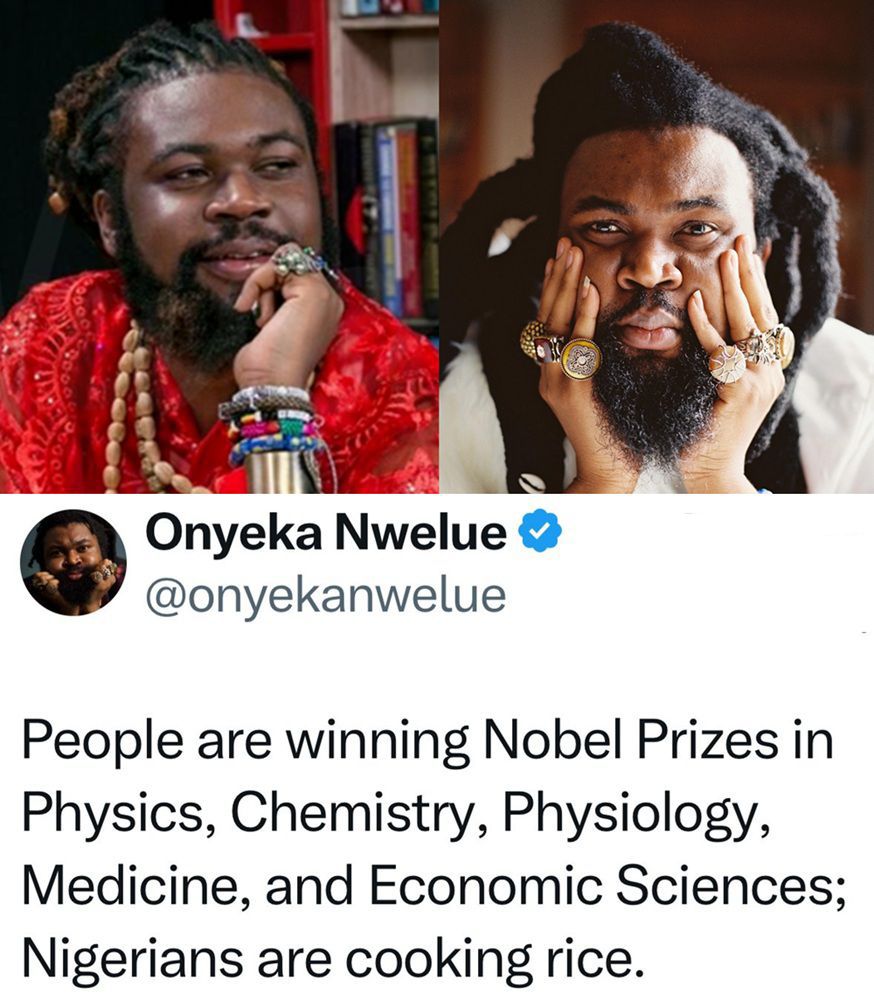
“People Are Winning Nobel Prizes While Nigerians Are Cooking Rice” – Onyeka Nwelue Sparks Outrage with Controversial Remark

Nigerian filmmaker, writer, and cultural critic Onyeka Nwelue has once again stirred heated debate across social media after making a controversial statement that has left many Nigerians reeling. In a post shared on his official X (formerly Twitter) handle, Nwelue remarked, “People are winning Nobel Prizes in Physics, Chemistry, Physiology, Medicine, and Economic Sciences; Nigerians are cooking rice.” The comment, which quickly went viral, has been met with both outrage and reflection as Nigerians grapple with the implications of his words and whether he is merely provoking or holding up a mirror to society. The post comes at a time when Nigeria is experiencing heightened interest in food-related cultural events, particularly after the historic attempts by chef Hilda Baci and others to set Guinness World Records with marathon cooking sessions. While such events have brought joy and pride to many citizens, others have criticized them as misplaced priorities in a country struggling with unemployment, insecurity, poor infrastructure, and brain drain. Nwelue’s statement tapped into this tension and immediately polarized opinion, with some accusing him of belittling national achievements and others agreeing that the nation has become distracted by frivolities while other countries are advancing in science, technology, and global innovation.
Supporters of Nwelue’s perspective argue that the obsession with cooking competitions, entertainment, and social media clout-chasing reveals a society that has abandoned rigorous pursuit of intellectual and scientific progress. Many commentators cited the lack of government investment in research and development, the collapse of Nigeria’s educational system, and the migration of its brightest minds abroad as reasons why the country lags behind in producing Nobel Prize-winning work. They insist that while there is nothing inherently wrong with celebrating food culture, the imbalance in priorities has turned Nigeria into a country where entertainment and survival overshadow innovation and serious achievement. Critics further noted that countries like Japan, South Korea, and Singapore invested decades into scientific research, STEM education, and innovation, and today they are global leaders, while Nigeria continues to celebrate what some call “surface-level achievements.” To them, Nwelue’s sharp words, though harsh, reflect a deeper national crisis that needs addressing.
On the other hand, many Nigerians found Nwelue’s statement insulting and dismissive of cultural pride. Defenders of events like the Guinness World Record cooking challenges insist that food is not just sustenance but an expression of identity, unity, and heritage. They argue that Nigerians, faced with economic hardship and insecurity, deserve moments of joy and togetherness, even if it comes in the form of cooking competitions. For many, Hilda Baci’s feat and the surge of similar culinary challenges symbolize resilience, creativity, and national spirit in the face of overwhelming odds. Some commentators accused Nwelue of elitism, arguing that not every citizen is destined for Nobel Prizes and that greatness should not be measured solely by academic or scientific laurels. They further point out that Nobel Prizes are not the only markers of global achievement and that cultural contributions, food diplomacy, and entertainment also project a nation’s soft power.
The controversy escalated as Nigerians on social media platforms dissected Nwelue’s remark, with hashtags related to his comment trending for hours. While some users mocked him, accusing him of seeking relevance through controversy, others engaged in sober reflection on what his words revealed about Nigeria’s global standing. Several intellectuals weighed in, with some academics acknowledging that the country’s poor state of research institutions and lack of funding for science and innovation remain alarming. A few Nigerian scientists abroad even joined the conversation, lamenting that their groundbreaking research often receives recognition internationally but little to no support from their home country.
Interestingly, the debate also highlighted the long-running tension between Nigeria’s pursuit of cultural visibility versus its pursuit of scientific credibility. Nigeria is globally recognized for its music, film, and food, with Afrobeats dominating the world stage and Nollywood being one of the largest film industries in the world. Yet, when it comes to scientific breakthroughs, the country often lags far behind. This imbalance, critics argue, is not necessarily the fault of ordinary Nigerians who celebrate cultural milestones, but rather a systemic failure of leadership and policy. The government’s neglect of education, chronic underfunding of universities, and brain drain have left Nigeria ill-prepared to produce Nobel laureates in the sciences.
Meanwhile, Nwelue himself has remained unapologetic. Known for his provocative style and unfiltered critiques of Nigerian society, he has built a reputation for pushing uncomfortable conversations. In the past, he has criticized Nigeria’s literary and artistic circles, its politics, and its approach to culture, often sparking storms of debate. His latest comment seems to follow the same trajectory—intended less as a casual remark and more as a deliberate jab meant to provoke reflection. Whether or not Nigerians heed the underlying message remains to be seen.
As the debate continues, one undeniable fact is that the statement has once again exposed the cracks in Nigeria’s collective priorities. It has raised questions about what kind of legacy the nation wishes to leave behind—one defined by resilience and culture, or one that also embraces rigorous intellectual, scientific, and technological innovation. For some, the two do not have to be mutually exclusive, but for others, the imbalance is glaring and must be urgently corrected.
At its core, the controversy surrounding Onyeka Nwelue’s statement underscores the identity crisis Nigeria faces in the 21st century. While countries around the world are pushing the frontiers of knowledge, discovering cures for diseases, creating revolutionary technologies, and winning Nobel Prizes, Nigeria is caught between survival, celebration of cultural resilience, and the pursuit of global recognition in ways that may not necessarily translate into development. Whether Nwelue’s remark will inspire policymakers, academics, and young Nigerians to rethink the nation’s direction, or whether it will simply be another fleeting social media uproar, is uncertain. But one thing is clear: in a country where even cooking rice can spark national debates, the struggle to balance culture, science, and progress is far from over.


